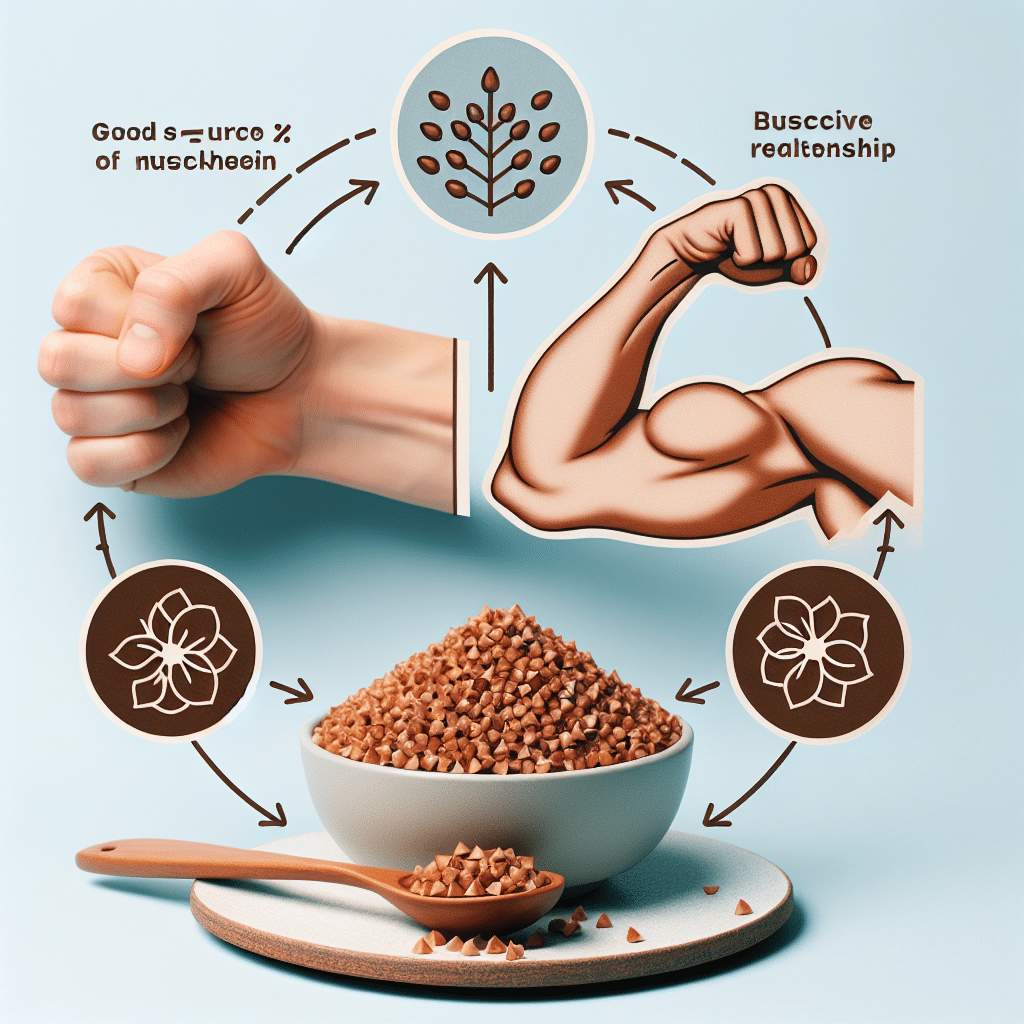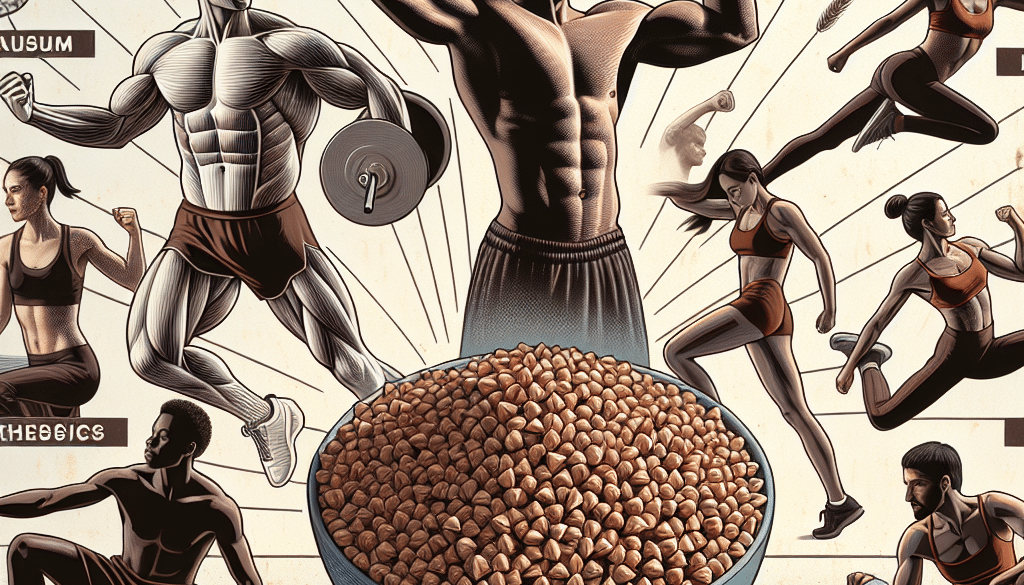Does Buckwheat Build Muscle?
-
Table of Contents
- Buckwheat and Muscle Building: A Comprehensive Analysis
- Understanding Buckwheat: A Nutritional Powerhouse
- Does Buckwheat Build Muscle?
- Protein Quality and Muscle Synthesis
- Energy and Performance
- Recovery and Muscle Growth
- Weight Management and Body Composition
- Comparing Buckwheat to Other Protein Sources
- Incorporating Buckwheat into a Muscle-Building Diet
- Conclusion: The Role of Buckwheat in Muscle Development
- Discover ETprotein’s Premium Protein Products
Buckwheat and Muscle Building: A Comprehensive Analysis

When it comes to building muscle, the role of diet cannot be overstated. Protein-rich foods are particularly important for muscle synthesis and recovery. Among various food sources, buckwheat has emerged as a nutritious and versatile option. But does buckwheat truly contribute to muscle building? This article delves into the nutritional profile of buckwheat, its potential benefits for muscle growth, and how it compares to other protein sources.
Understanding Buckwheat: A Nutritional Powerhouse
Buckwheat, despite its name, is not related to wheat and is actually a gluten-free seed. It’s a pseudocereal that has been consumed for thousands of years in Asia and Europe, and more recently has gained popularity in North America for its health benefits.
- Protein Content: Buckwheat is a good source of high-quality plant protein, containing all nine essential amino acids, which are the building blocks of protein.
- Mineral Rich: It is rich in minerals such as magnesium, iron, and zinc, which are crucial for muscle function and recovery.
- Complex Carbohydrates: Buckwheat is high in complex carbohydrates, providing sustained energy for workouts and daily activities.
- Fiber: It is also high in dietary fiber, which aids in digestion and satiety, helping to manage weight and support overall health.
- Antioxidants: Buckwheat contains rutin and other bioflavonoids, which have antioxidant properties that can help reduce inflammation and support recovery.
Does Buckwheat Build Muscle?
The direct impact of buckwheat on muscle building is a topic of interest for athletes and fitness enthusiasts. While buckwheat alone is not a magic bullet for muscle growth, its nutritional components make it a valuable addition to a muscle-building diet.
Protein Quality and Muscle Synthesis
Protein is essential for muscle repair and growth. The quality of protein is determined by its amino acid profile and digestibility. Buckwheat protein is high-quality due to its completeness in essential amino acids, particularly lysine, which is often limited in plant-based diets. This makes buckwheat an excellent protein source for vegetarians and vegans looking to build muscle.
Energy and Performance
The complex carbohydrates in buckwheat provide a steady release of energy, which is vital for fueling workouts. Adequate energy intake supports endurance and performance, allowing for more intense and effective training sessions, which are key for muscle growth.
Recovery and Muscle Growth
Magnesium and zinc found in buckwheat are minerals that play a role in muscle recovery. Magnesium is involved in muscle contraction and relaxation, while zinc contributes to protein synthesis and hormone regulation, including testosterone, which can influence muscle growth.
Weight Management and Body Composition
The fiber content in buckwheat can help with weight management by promoting satiety and reducing overall calorie intake. Maintaining a healthy weight is important for optimizing body composition and improving muscle definition.
Comparing Buckwheat to Other Protein Sources
When it comes to building muscle, it’s important to compare buckwheat to other protein sources to understand its place in a balanced diet.
- Animal Proteins: Animal proteins such as chicken, beef, and eggs are complete proteins with high biological value. They are readily used by the body for muscle building but may not be suitable for those following a plant-based diet.
- Other Plant Proteins: Legumes, nuts, and seeds are also good sources of plant protein. However, they may lack one or more essential amino acids, making it necessary to consume a variety of plant proteins to ensure a complete amino acid profile.
- Protein Supplements: Whey and casein are popular protein supplements known for their high-quality protein and fast absorption. Plant-based protein powders, such as pea or rice protein, are alternatives for those avoiding dairy or following a vegan diet.
While buckwheat is a valuable source of plant protein, it’s important to include a variety of protein sources in your diet to ensure you’re getting a full spectrum of amino acids and nutrients.
Incorporating Buckwheat into a Muscle-Building Diet
Buckwheat can be easily incorporated into meals and snacks throughout the day. Here are some ideas:
- Breakfast: Buckwheat pancakes or porridge topped with nuts and seeds.
- Lunch: Buckwheat salad with mixed vegetables and a protein source like tofu or chicken.
- Dinner: Buckwheat noodles or soba in a stir-fry with a variety of colorful vegetables and lean meat or fish.
- Snacks: Buckwheat crackers with hummus or a buckwheat smoothie with fruits and protein powder.
Conclusion: The Role of Buckwheat in Muscle Development
Buckwheat is a nutritious food that can contribute to muscle building when included as part of a balanced diet rich in protein and other essential nutrients. Its high-quality protein, complex carbohydrates, and mineral content support muscle synthesis, energy levels, and recovery. While it should not be relied upon as the sole source of protein, buckwheat is an excellent addition to the diets of those looking to increase muscle mass, particularly for vegetarians and vegans.
Discover ETprotein’s Premium Protein Products
If you’re looking to supplement your diet with high-quality protein, consider ETprotein’s range of organic bulk vegan proteins. Their products, including organic rice protein, pea protein, and various seed proteins, are characterized by a neutral taste, non-GMO, and allergen-free attributes. With L-(+)-Ergothioneine purity over 98%, ETprotein caters to a diverse range of industries and dietary needs. Enhance your muscle-building regimen with ETprotein’s reliable and effective protein solutions.
About ETprotein:
ETprotein, a reputable protein and L-(+)-Ergothioneine (EGT) Chinese factory manufacturer and supplier, is renowned for producing, stocking, exporting, and delivering the highest quality organic bulk vegan proteins and L-(+)-Ergothioneine. They include Organic rice protein, clear rice protein, pea protein, clear pea protein, watermelon seed protein, pumpkin seed protein, sunflower seed protein, mung bean protein, peanut protein, and L-(+)-Ergothioneine EGT Pharmaceutical grade, L-(+)-Ergothioneine EGT food grade, L-(+)-Ergothioneine EGT cosmetic grade, L-(+)-Ergothioneine EGT reference grade and L-(+)-Ergothioneine EGT standard. Their offerings, characterized by a neutral taste, non-GMO, allergen-free attributes, with L-(+)-Ergothioneine purity over 98%, 99%, cater to a diverse range of industries. They serve nutraceutical, pharmaceutical, cosmeceutical, veterinary, as well as food and beverage finished product distributors, traders, and manufacturers across Europe, USA, Canada, Australia, Thailand, Japan, Korea, Brazil, and Chile, among others.
ETprotein specialization includes exporting and delivering tailor-made protein powder and finished nutritional supplements. Their extensive product range covers sectors like Food and Beverage, Sports Nutrition, Weight Management, Dietary Supplements, Health and Wellness Products, and Infant Formula, ensuring comprehensive solutions to meet all your protein needs.
As a trusted company by leading global food and beverage brands and Fortune 500 companies, ETprotein reinforces China’s reputation in the global arena. For more information or to sample their products, please contact them and email sales(at)ETprotein.com today.












